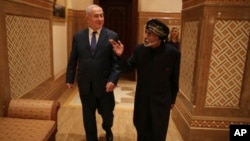Israeli Prime Minister Benjamin Netanyahu on Friday returned from an unannounced visit to Oman, the two countries confirmed, meeting the Gulf state's leader in the first visit of its kind in over 20 years.
The surprise visit was an important accomplishment for the Israeli leader, who frequently boasts of warming behind-the-scenes contacts with moderate Sunni Arab states. But there were few concrete details on his talks with Oman's Sultan Qaboos bin Said.
The sultanate has long had a low-key role in fostering negotiations between the Israelis and Palestinians. Days before Netanyahu's visit, Palestinian President Mahmoud Abbas also visited Oman, raising the possibility that Oman might be trying to help revive negotiations or push forward a troubled U.S. peace plan.
Oman, which sits on the southeastern tip of the Arabian Peninsula, with Saudi Arabia to its north and Iran to its east, also has a long record of being a quiet broker in the region, opting to stay on the sidelines of the rivalry between the two regional powerhouses.
Netanyahu and Sultan Qaboos issued a joint statement saying the two sides "discussed ways to advance the Middle East peace process and discussed a number of issues of mutual interest to achieve peace and stability in the Middle East."
While Oman's influence over Israel and the Palestinians is limited, its unique regional position could enable it to play a bigger role mediating between Israel and archenemy Iran.Israel has repeatedly expressed concern about Iran's military activities and support for Shiite militias in neighboring Syria and warned that it will not allow Iran to maintain a permanent military presence in Syria.
In recent months, Israel has carried out a number of strikes on Iranian positions in Syria.In addition, U.S. sanctions on Iran are to soon go into effect after the Trump administration, with strong Israeli support, backed out of the international nuclear agreement with Iran negotiated by the Obama administration.
Netanyahu's office said he had been invited by the sultan after lengthy communications. Oman state TV carried images of the two leaders meeting and Netanyahu shared a video of his visit on his official social media accounts, calling it "a special visit to Oman — making history!"
Israel and Oman do not have diplomatic relations. Israel is only officially recognized by two Arab states — Egypt and Jordan.
The meeting was the first between leaders of the two countries since then-Prime Minister Shimon Peres visited in 1996.
Abbas also paid a three-day visit to Oman earlier this week but it wasn't clear whether the visits were connected.
A senior Palestinian official said the sultan had offered to play a role mediating between the Palestinians and Israelis, and that Abbas had said he welcomes any "meaningful" peace process. But the official said the visit was mostly connected to Oman's "regional role."
The official spoke on condition of anonymity because he was not authorized to discuss the matter with the media.
Israel and the Palestinians have not held substantive peace talks for the past decade. While President Donald Trump has promised a Mideast peace plan, U.S. relations with the Palestinians have deteriorated and his efforts to produce the "Deal of the Century" have so far proven fruitless.
The Palestinians cut ties with the U.S. after the White House recognized Jerusalem as Israel's capital and then moved the American embassy there in May. The U.S. has also cut funding to the U.N. agency for Palestinian refugees and shuttered the Palestinian Liberation Organization office in Washington. All have further alienated the Palestinians.
The U.S. has not released details of the plan, but it is widely expected to include a role for Saudi Arabia and other moderate Gulf states.
Arab states, including Oman, remain publicly committed to calls for a Palestinian state with east Jerusalem as its capital. Oman has joined a chorus of Arab countries that have strongly condemned Israel's killing of Palestinians in Gaza protests that erupted in May and continued Friday.
Netanyahu and his wife were joined on the trip by the head of Mossad, Israel's intelligence agency, his national security adviser, his Foreign Ministry director, and other defense officials.
Sultan Qaboos has managed to steer his country through choppy regional politics with a policy of non-interference, helping broker the release of Western hostages in Yemen and providing a back door for communications between Washington and Tehran under the Obama administration. Although it is a member of the Saudi-led six-nation Gulf Cooperation Council, it did not join the kingdom in its boycott of Qatar or the war in Yemen.
Netanyahu has repeatedly stated in recent years that Israel has developed good relations with several Arab states, despite a lack of official ties. But he rarely publicizes these contacts or identifies his partners.
In the lead-up to Friday's surprise visit to Oman, there have been signs that Israel's behind the scenes dialogue with Arab states is becoming more public.
In February, Oman's foreign minister made a rare visit by an Arab official to Jerusalem's Al-Aqsa mosque compound and to the West Bank.
The following month, Omani officials joined their Arab counterparts from the United Arab Emirates, Saudi Arabia, Qatar and Bahrain at the White House for a meeting with Israeli national security officials to discuss the dire humanitarian situation in the Gaza Strip.




